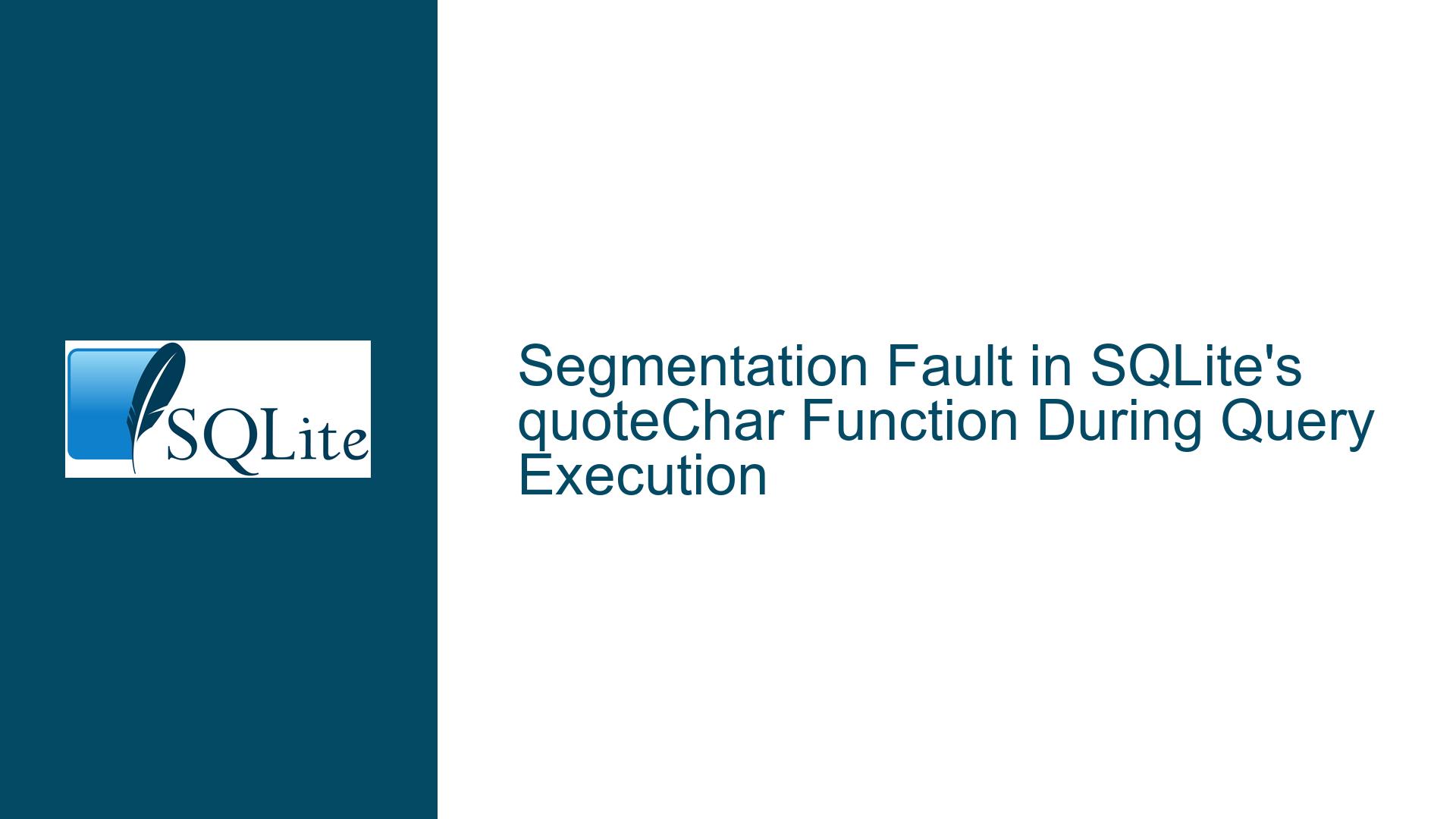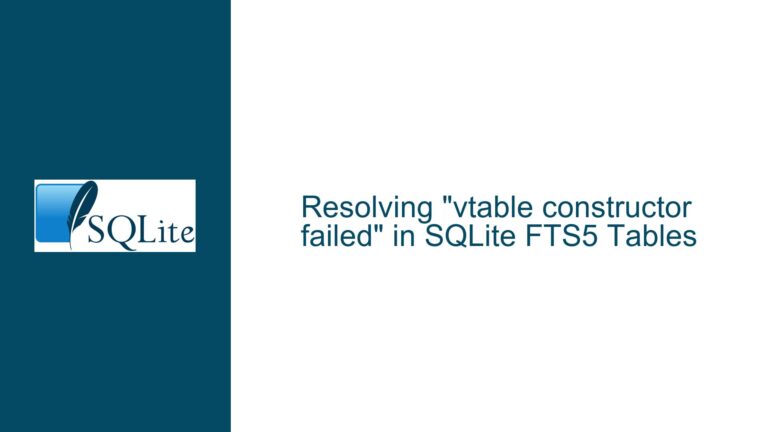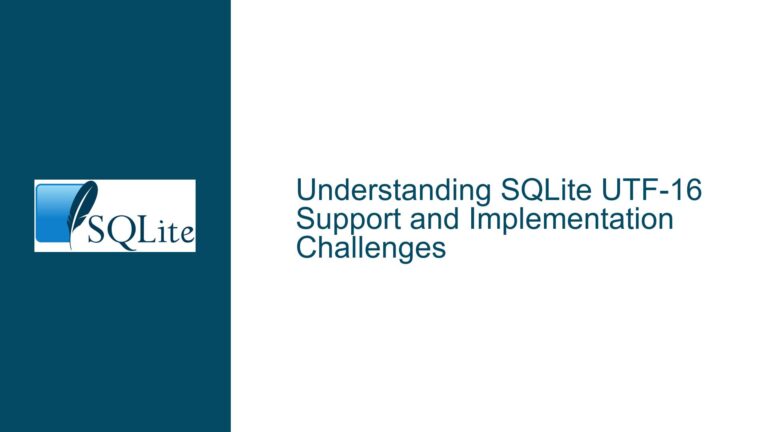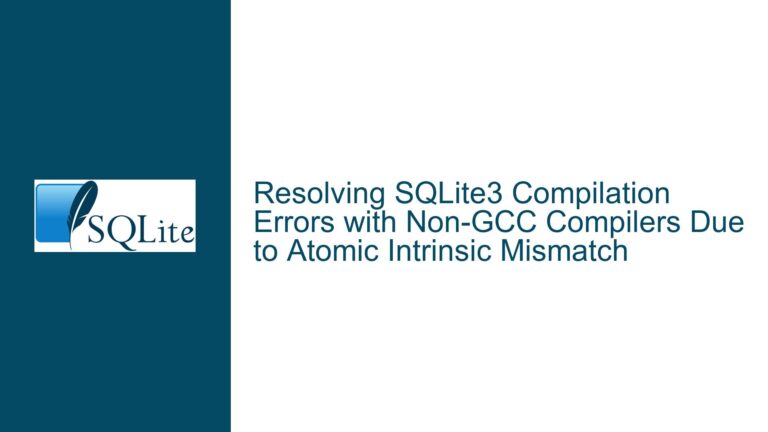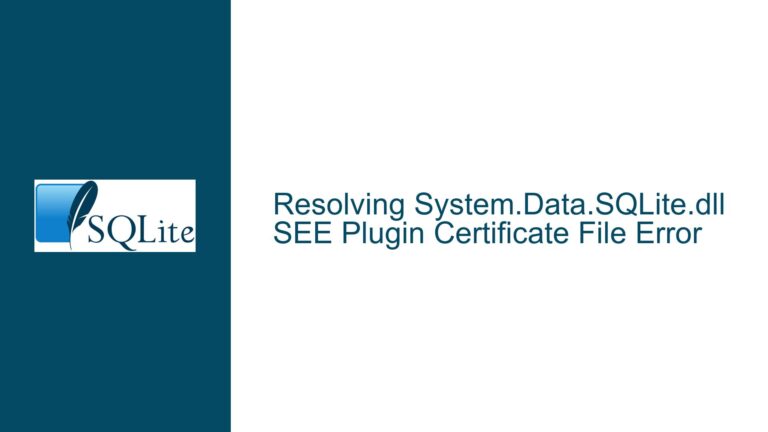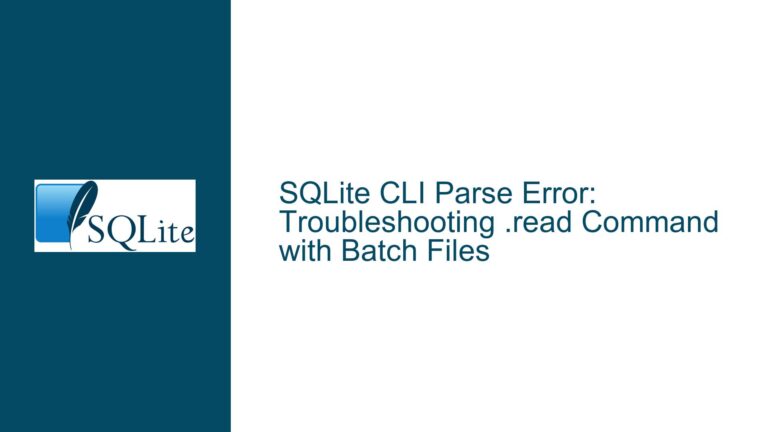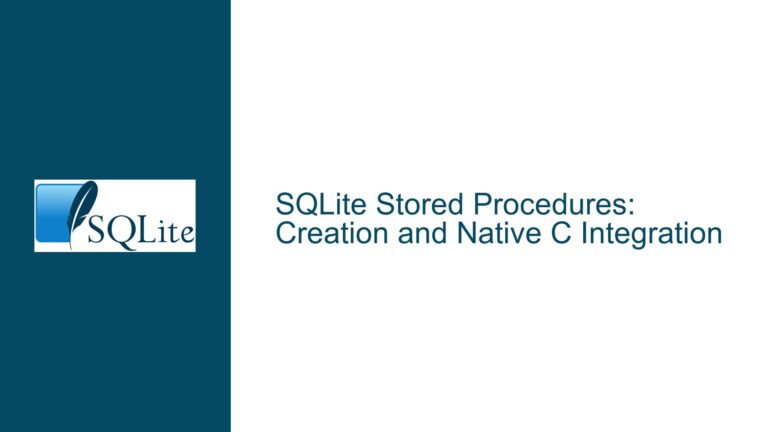Segmentation Fault in SQLite’s quoteChar Function During Query Execution
Issue Overview: Segmentation Fault in quoteChar Function During Query Execution
The core issue revolves around a segmentation fault occurring in the quoteChar function within SQLite’s shell.c file. This fault is triggered during the execution of a series of SQLite shell commands and queries. The segmentation fault is identified by the AddressSanitizer (ASAN) report, which indicates a READ memory access violation at address 0x000000000000. This address points to the zero page, suggesting that the program is attempting to dereference a null pointer.
The specific sequence of commands leading to the fault includes setting the output mode to column and insert, enabling query plan explanation with .eqp 3, setting a limit with .limit LE 0, and executing a PRAGMA statement. The fault occurs in the quoteChar function, which is called by shell_callback, and subsequently by exec_prepared_stmt, shell_exec, runOneSqlLine, process_input, and finally main. The fault is consistent and reproducible, as indicated by the ASAN report and the provided stack trace.
The issue is reminiscent of a previously discussed problem, which was addressed with a specific patch. However, the current segmentation fault suggests that either the patch did not fully resolve the underlying issue or that a new, related issue has emerged. The compilation flags used during the build include various debugging and optimization options, such as enabling tree tracing, where tracing, cursor hints, and statistical optimizations. These flags are intended to provide detailed insights into SQLite’s internal operations but may also introduce complexities that contribute to the fault.
Possible Causes: Null Pointer Dereference in quoteChar Function
The segmentation fault in the quoteChar function is most likely caused by a null pointer dereference. This occurs when the function attempts to read from a memory address that has not been properly initialized or has been set to null. The ASAN report explicitly points to a READ memory access at address 0x000000000000, which is a strong indicator of a null pointer dereference.
One possible cause is that the quoteChar function is being called with an invalid or null pointer as one of its arguments. This could happen if the preceding functions (shell_callback, exec_prepared_stmt, etc.) fail to properly initialize or pass the necessary data structures. For example, if the shell_callback function does not correctly set up the callback data or if the exec_prepared_stmt function fails to prepare the SQL statement properly, the quoteChar function may receive a null pointer, leading to the segmentation fault.
Another potential cause is related to the specific SQLite shell commands and queries being executed. The sequence of commands includes setting the output mode, enabling query plan explanation, setting a limit, and executing a PRAGMA statement. It is possible that one of these commands, particularly the PRAGMA statement, is causing the SQLite shell to enter a state where the quoteChar function is called with invalid parameters. The .limit LE 0 command, which sets a limit on the number of rows returned by a query, may also be contributing to the issue by altering the behavior of subsequent queries in an unexpected way.
The compilation flags used during the build may also play a role in the segmentation fault. Flags such as -DSQLITE_DEBUG, -DSQLITE_ENABLE_TREETRACE, and -DSQLITE_ENABLE_WHERETRACE enable detailed debugging and tracing features that can affect the behavior of SQLite’s internal functions. While these flags are useful for diagnosing issues, they can also introduce additional complexity and potential sources of errors. For example, enabling tree tracing or where tracing may cause SQLite to generate additional data structures or perform additional checks that could lead to unexpected behavior in the quoteChar function.
Finally, the issue may be related to a previously identified problem that was addressed with a patch. The patch in question was intended to resolve a similar segmentation fault, but it is possible that the patch did not fully address the underlying issue or that the current issue is a new manifestation of a related problem. The fact that the segmentation fault occurs in the same function (quoteChar) suggests that the root cause may be similar, but further investigation is needed to determine whether the current issue is a regression or a new problem.
Troubleshooting Steps, Solutions & Fixes: Diagnosing and Resolving the quoteChar Segmentation Fault
To diagnose and resolve the segmentation fault in the quoteChar function, a systematic approach is required. The following steps outline a detailed troubleshooting process, including potential solutions and fixes.
Step 1: Reproduce the Issue in a Controlled Environment
The first step is to reproduce the segmentation fault in a controlled environment. This involves setting up a clean build of SQLite with the same compilation flags and executing the sequence of commands that trigger the fault. Reproducing the issue in a controlled environment ensures that the problem is consistent and not caused by external factors such as system configuration or environmental variables.
To reproduce the issue, follow these steps:
- Clone the latest version of SQLite from the official repository.
- Apply the same compilation flags used in the original build:
export CFLAGS="-g -DSQLITE_DEBUG -DSQLITE_ENABLE_TREETRACE -DSQLITE_ENABLE_WHERETRACE -DSQLITE_ENABLE_CURSOR_HINTS -DSQLITE_COUNTOFVIEW_OPTIMIZATION -DSQLITE_ENABLE_STAT4" - Configure and build SQLite with the
--enable-all,--enable-debug, and--disable-sharedoptions:./configure --enable-all --enable-debug --disable-shared && make - Execute the sequence of commands that trigger the segmentation fault:
.mode column .mode insert .eqp 3 .limit LE 0 PRAGMA j - Observe the output and check for the segmentation fault.
Step 2: Analyze the ASAN Report and Stack Trace
Once the issue is reproduced, the next step is to analyze the ASAN report and stack trace to identify the exact location and cause of the segmentation fault. The ASAN report provides detailed information about the memory access violation, including the address being accessed, the type of access (READ or WRITE), and the stack trace leading up to the fault.
The stack trace indicates that the fault occurs in the quoteChar function at line 1167 of the shell.c file. The function is called by shell_callback, which is in turn called by exec_prepared_stmt, shell_exec, runOneSqlLine, process_input, and main. This sequence of calls suggests that the fault is related to the execution of SQLite shell commands and queries.
To further analyze the issue, examine the quoteChar function in the shell.c file. The function is responsible for quoting characters in SQL statements, and it is likely that the fault occurs when the function attempts to access a null or invalid pointer. Review the function’s implementation and identify any potential sources of null pointer dereferences.
Step 3: Review the Previous Patch and Related Issues
Given that a similar issue was previously addressed with a patch, it is important to review the patch and related issues to determine whether the current segmentation fault is a regression or a new problem. The previous patch was intended to resolve a segmentation fault in the quoteChar function, but it is possible that the patch did not fully address the underlying issue or that the current issue is a new manifestation of a related problem.
Review the patch and the related forum post to understand the changes made and the rationale behind them. Compare the changes to the current implementation of the quoteChar function to identify any discrepancies or potential sources of the current issue. If the patch was intended to address a specific scenario, consider whether the current issue falls within that scenario or represents a new case.
Step 4: Debug the quoteChar Function and Related Code
To further diagnose the issue, use a debugger to step through the quoteChar function and related code. Set breakpoints at the entry point of the quoteChar function and at key points in the calling functions (shell_callback, exec_prepared_stmt, etc.). Run the SQLite shell with the sequence of commands that trigger the segmentation fault and observe the behavior of the code as it executes.
Pay close attention to the values of pointers and variables passed to the quoteChar function. Check for any instances where a null or invalid pointer is passed to the function. If a null pointer is detected, trace back through the calling functions to identify where the pointer was initialized or modified.
Step 5: Implement and Test Potential Fixes
Based on the analysis and debugging, implement potential fixes for the segmentation fault. Possible fixes include:
Null Pointer Check in quoteChar Function: Add a null pointer check at the beginning of the
quoteCharfunction to prevent dereferencing a null pointer. If a null pointer is detected, handle it appropriately (e.g., by returning an error or skipping the operation).Fix Initialization in Calling Functions: Ensure that the calling functions (
shell_callback,exec_prepared_stmt, etc.) properly initialize and pass the necessary data structures to thequoteCharfunction. This may involve adding additional checks or initializations in these functions.Review and Modify SQLite Shell Commands: Review the sequence of SQLite shell commands that trigger the segmentation fault. Consider whether the commands are being used correctly and whether they may be causing the SQLite shell to enter an unexpected state. Modify the commands or their order if necessary to avoid triggering the fault.
Revisit Compilation Flags: Review the compilation flags used during the build and consider whether they may be contributing to the issue. For example, disabling certain debugging or tracing features may help isolate the problem. Experiment with different combinations of flags to determine whether they affect the occurrence of the segmentation fault.
After implementing a potential fix, rebuild SQLite and test the sequence of commands to verify that the segmentation fault is resolved. Repeat the debugging process if necessary to ensure that the fix is effective and does not introduce new issues.
Step 6: Submit a Patch or Report the Issue
If the segmentation fault is resolved, consider submitting a patch to the SQLite development team or contributing the fix to the official repository. Provide a detailed description of the issue, the analysis, and the fix to help the team understand and review the changes.
If the issue persists or if further investigation is needed, consider reporting the issue to the SQLite development team or the SQLite forum. Provide all relevant information, including the ASAN report, stack trace, compilation flags, and steps to reproduce the issue. This will help the team diagnose and address the issue in future releases.
Conclusion
The segmentation fault in the quoteChar function is a complex issue that requires a thorough and systematic approach to diagnose and resolve. By reproducing the issue in a controlled environment, analyzing the ASAN report and stack trace, reviewing previous patches and related issues, debugging the code, and implementing potential fixes, it is possible to identify and address the root cause of the fault. The process outlined above provides a detailed guide for troubleshooting and resolving the issue, ensuring that SQLite operates reliably and efficiently.
